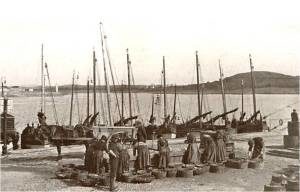 Herring processing, Ardgladd, Ireland 1920s. Source: http://www.banffshiremaritime.org.uk
Herring processing, Ardgladd, Ireland 1920s. Source: http://www.banffshiremaritime.org.ukGendered change in fisheries is starting to emerge as a significant field of research. This new research paper from Easkey Britton, published in Maritime Studies, finds that, over the last century – from the days of the independent “herring lassies” to the days of fisheries decline and factory closures – women have become less and less visible, but more and more important to family well-being, often at the expense of subjugating their own needs. The paper is called “Women as agents of wellbeing in Northern Ireland’s Fishing households.”
Abstract
This paper focuses on the gender dimensions of wellbeing in fishing households in Northern Ireland. The impact of change in the fishing industry on women’s wellbeing is outlined and linkages are made between changing access to fish and changing roles of women in fishing households. The paper explores what this change means for how women perceive and pursue their wellbeing needs and aspirations and how they negotiate their needs with the needs of the household. In an occupation as gender biased as fishing it is argued that in order for fisheries management and policy to be successful, a profile of what really matters to people is important. In particular, the paper highlights how such priorities link to the complex and dynamic role of women in fishing households.
The paper is open access and can be downloaded here
Also check out our earlier story on northern UK women in fisheries, covering a previous paper by Easkey and one by Minghua Zhao and colleagues. Link
This entry was posted in: Gender, Marine Fisheries, Men, Women
